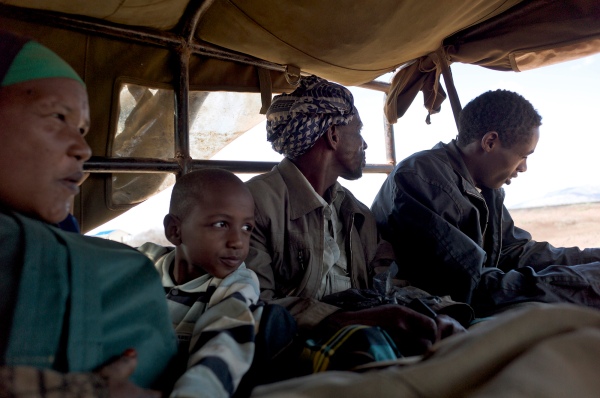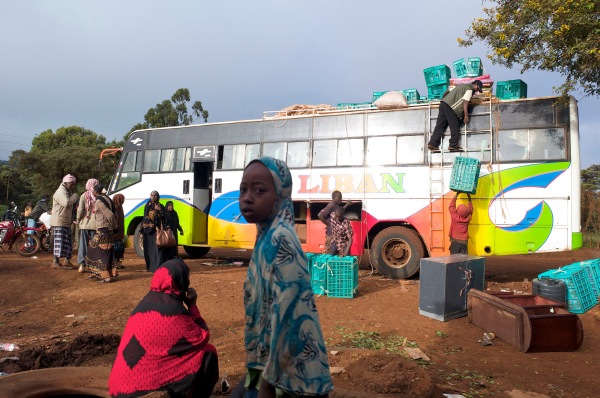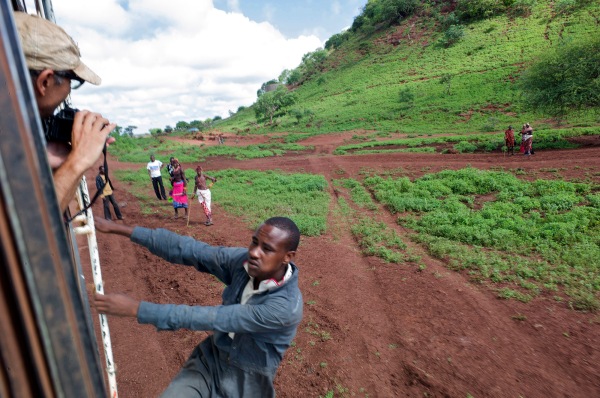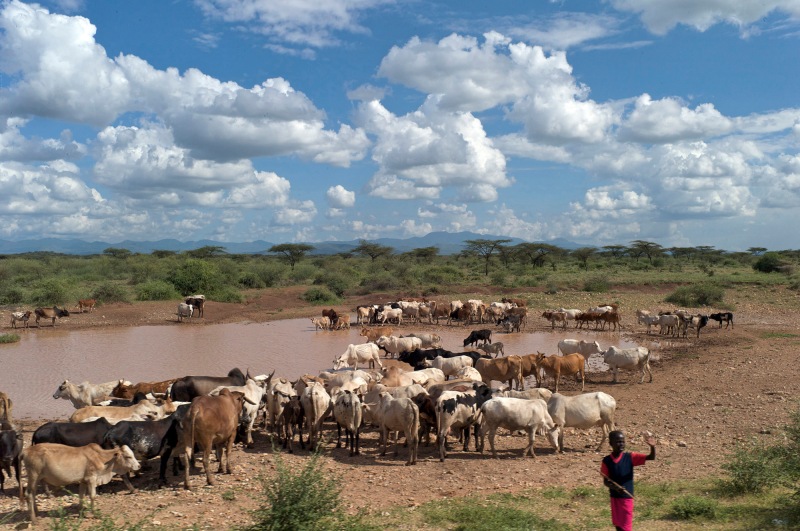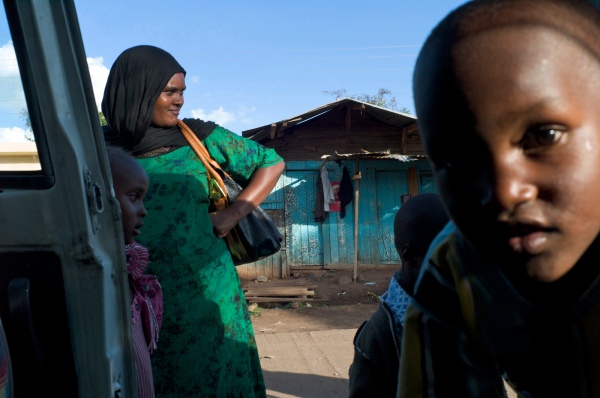Recently I was online viewing the portfolios of legendary photographers Roy DeCarava, W. Eugene Smith and Henri Cartier Bresson. I marveled at their artistic and documentary oriented bodies of work. I’m an independent photojournalist, based in Nairobi, Kenya, and I appreciate the work of photographers who combine documentary with an artistic vision. Seemingly past generations of photographers could document communities, with an eye towards spontaneity and creativity, without the challenges faced by photographers today. Undoubtedly they too had to deal with the occasional citizen who would just as well have tarred and feathered a photographer than be photographed.
Today, disturbingly, such an attitude is embraced by far too many. It’s not so much that photographers are viewed as annoying, there’s a widespread opinion of photographers as security threats. The public, and law enforcement officials, have become increasingly suspicious of our actions. While paranoia rules so too does misunderstanding. No person taking photographs with criminal intent would blatantly lay on their stomach or stand on a bench (photographers are always searching for a good angle) on a public street and spend hours exposing themselves for all to see. A would-be bad guy surveying a building, to commit an act of terrorism, would discreetly do so using a cellphone camera.
Digital camera technology has ushered in an era in which there is an ease to taking quick point and shoot photographs, and many people do so. However for any photographer who works in a documentary style these can be difficult times. Going out to photograph unposed and candid moments invites not just suspicion, but confrontation or even assault. Recently after spending two weeks in Addis Ababa, Ethiopia I decided to return to Nairobi via bus (1081 miles); I even hitchhiked on the back of Kenyan military vehicle. I made three overnight stays in small towns along the way so it took three days to arrive in Nairobi. 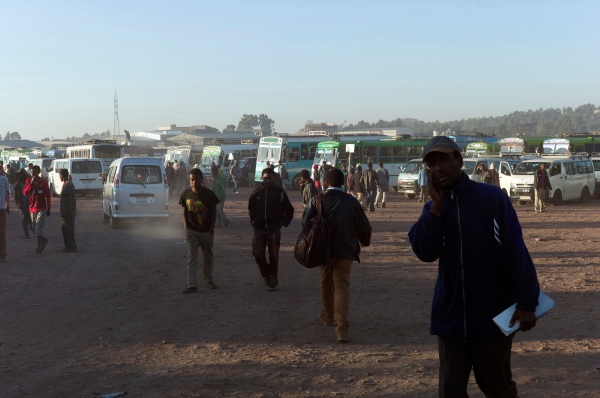 From the start it was apparent that taking photographs was an invitation for trouble: at an outdoor bus station I was surrounded and confronted by approximately thirteen Ethiopian men (they appeared to be private citizens), who took issue with me photographing the early morning activity of buses and people coming and going. One man shouted in English, “no photos!” The situation felt unnecessarily tense and unsafe but eventually, with assistance from an English and Amharic speaking bystander, I got them to calm down and go away. This set the tone for the entire trip. Consequently, I had to take photographs zone focusing (estimating the distance from my subjects) while shooting from my hip or discreetly from bus windows. Periodically I would ask permission to take photographs but more often than not was refused or money was demanded. Upon my return to Nairobi I exchanged emails with my ex-wife about the experience, and she reminded me about the long history of foreigners painting unfavorable portrayals of Africans. Indeed, peoples of Third World countries are sensitive to outsiders not only telling their stories – from a Western perspective – but profiting as well. Undoubtedly they’re also worried about strangers committing acts of terrorism. All of which I can understand but it was a frustrating and unnecessarily confrontational experience just the same.
From the start it was apparent that taking photographs was an invitation for trouble: at an outdoor bus station I was surrounded and confronted by approximately thirteen Ethiopian men (they appeared to be private citizens), who took issue with me photographing the early morning activity of buses and people coming and going. One man shouted in English, “no photos!” The situation felt unnecessarily tense and unsafe but eventually, with assistance from an English and Amharic speaking bystander, I got them to calm down and go away. This set the tone for the entire trip. Consequently, I had to take photographs zone focusing (estimating the distance from my subjects) while shooting from my hip or discreetly from bus windows. Periodically I would ask permission to take photographs but more often than not was refused or money was demanded. Upon my return to Nairobi I exchanged emails with my ex-wife about the experience, and she reminded me about the long history of foreigners painting unfavorable portrayals of Africans. Indeed, peoples of Third World countries are sensitive to outsiders not only telling their stories – from a Western perspective – but profiting as well. Undoubtedly they’re also worried about strangers committing acts of terrorism. All of which I can understand but it was a frustrating and unnecessarily confrontational experience just the same.
It would be easy to dismiss the problems I experienced as symbolic of living in a region where the rights of photojournalist have not long been respected. However photojournalist in the United States, and elsewhere in the Western world, experience similar problems. Security issues have dramatically altered the manner in which people perceive threats. Such is the nature of the world in which we live. It’s a world in which concerns about safety increasingly clash with basic freedoms. “Those who would sacrifice freedom for safety deserve neither,” stated Benjamin Franklin. His words are as apt today as they were during the American revolutionary war.
During my ordeal at the Ethiopian bus station I was told that someone in the crowd suggested I could be a spy. The accuser lacked commonsense. It goes without saying that there are militant groups and unstable individuals who aim to inflict harm upon others. Nevertheless, democratic societies cannot permit themselves to become open-aired prisons in which self-appointed guardians, or law enforcement officials, can prohibit the right of individuals to take photographs, on a public street, be it in Ethiopia, Kenya or the U.S. The body of work created by photographers of yesteryear provided an important historical, cultural and artistic archive of our collective past. Unhampered access to public places, foreign or otherwise, must remain so for the benefit of future generations.
